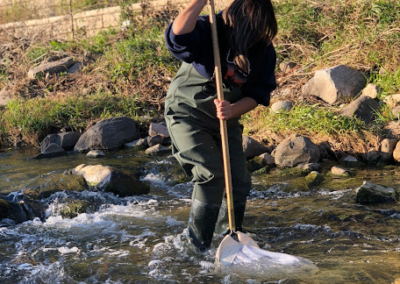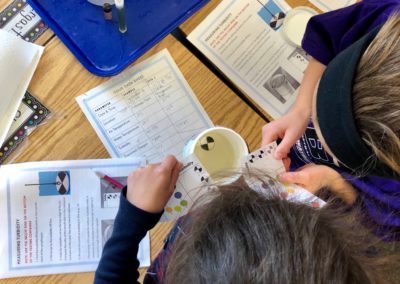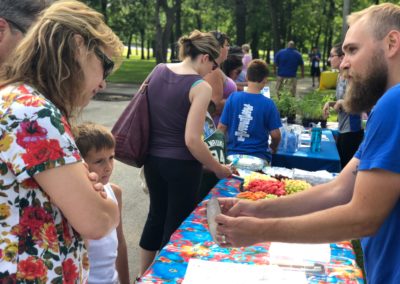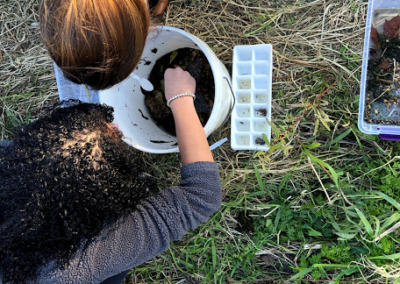Classroom Programs
Milwaukee Riverkeeper provides free, in-classroom lessons and activities for 4th-9th graders. Our program is designed for students to interact with local rivers, use professional-grade testing equipment, and analyze live water samples without leaving school grounds.
Students become scientists in their own classroom! We prioritize schools without resources for off-campus field trips. Students leave with an understanding and appreciation for local freshwater resources and exposure to STEM future careers. Most importantly, students will gain a better understanding of how they personally can affect our waterways and become environmental stewards.
Program Goals:
- Provide meaningful, hands-on learning opportunities in classrooms
- Connect students from all around the Milwaukee River Basin to their freshwater resources
- Develop knowledgeable and active lifelong environmental stewards through hands-on exploration of their waterways
- Create a sense of student ownership and respect for a brighter freshwater future in Milwaukee
Available Classroom Programs:
- An Introduction to Water: How much water is there? Why is water important? What makes the city of Milwaukee special? Who is affected by water quality? What does Milwaukee Riverkeeper do? Students will learn about freshwater on Earth by helping the presenter with a simple but effective demonstration showing the scarcity of freshwater. They will identify the major water sources in Wisconsin by looking at a map, define what “riverkeeper” may mean, and finish the lesson with a discussion about freshwater.
- Watersheds 101: What is a watershed? What are rivers’ role in a watershed? What watershed do you live in? In addition, students will do a classroom ‘stream tour’ where they investigate which physical, chemical, and biological characteristics are affecting our rivers. This lesson includes a watershed modeling hands-on activity. Finally, students will be able to take a peek and do some work with our yearly publication: the Milwaukee River Basin Report Card.
- Riverkeeper for a Day: What indicators and characteristics do Milwaukee Riverkeeper scientists and volunteers look for when testing water in the field? Why? What equipment do they use? Why is dissolved oxygen so important? How about pH or turbidity? What happens if too much salt gets into our rivers? Too much phosphorus? Students will use our equipment to test their own water samples and become a Riverkeeper for the day! Note: This lesson can be broken into two different days for classrooms that are interested in going into further detail about water quality indicators.
- Living Things in our Streams: Students will become familiar with all of the creepy-crawly bugs that are living in our waterways. They will address the following questions: What are macroinvertebrates? Why are they important in determining water quality? What is a biotic index? What do mussels do? Why are they important? This is a fun lesson that allows students to see how the presence/absence of bugs and animals can indicate the health of our rivers.
- Hidden Harms: Emerging Contaminants in Our Waters: In this lesson, students explore the chemicals in everyday products polluting our rivers. Students also hear from real scientists to learn how these contaminants cause problems for our fish and wildlife. Together, we’ll find ways to keep these pollutants out of our waters. Since many students are learning online today, we made sure these concepts could be explored from home, activity-centered, and engaging.
- Plastics: An Audit: Are your students interested in learning about the increasingly plastic world around them? Milwaukee Riverkeeper provides a free, in-classroom lesson and audit that will help students understand the lifecycle of plastic, how the process of creating plastics causes pollution, and how their disposal leads to problems in our ecosystems. Along with a lesson, students can conduct an audit with their own plastic wastes, discuss problems and patterns with plastics, as well as reflect on solutions through their own lens.
Environmental Science with Mermaid Echo (available until end of December 2023):
- 🧜♀️Microplastics (1st – 4th): Interactive, theatrical story time about a mermaid who travels across the Atlantic Ocean to save her friends who are getting ill from a microplastic invasion.
- 🧜♀️Pollution (K5 – 3rd): The pollution curriculum is called “Trash Safari,” where kids become all different kinds of pollution along the way.
- 🧜♀️Invasive Species (1st – 5th): The third and final cirriculum is called “Invaders,” and it teaches kids about the Qugga Mussel, and how it has completely re-weritten the ecological makeup of Lake Michigan.
Get your feet wet! Contact our Education Coordinator, Kia Vang, at education@milwaukeeriverkeeper.org for more information.
🧜♀️ To schedule a classroom visit with Mermaid Echo, contact both Kia Vang, and Pierce VanValkenburg at education@milwaukeeriverkeeper.org and info@mermaidecho.com




